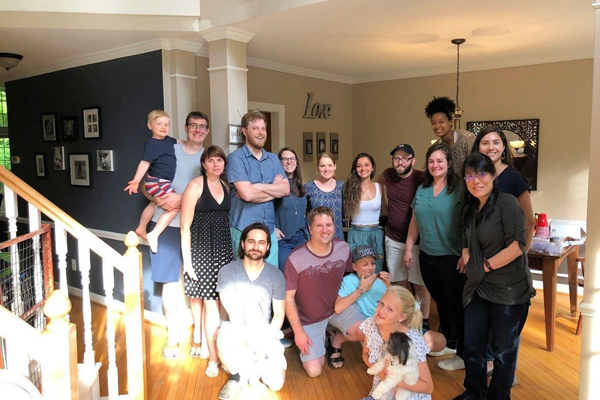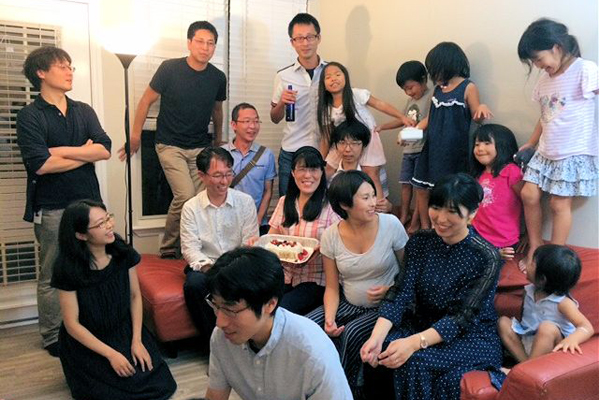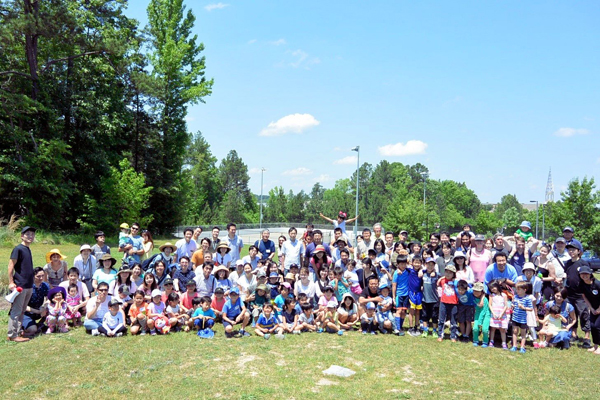(2022.6.15) Yuko NakamichiLet's study abroad!
(2022.6.15)Hard tissue disease control reconstruction course Associate Professor Yuko Nakamich
Regardless of your age or gender, let’s jump into oversea countries! You will have wonderful and irreplaceable experience there. You will be able to build friendship that will last a lifetime, and you will surely find new possibilities of yourself.
First of all, I would like to write about my background related to my decision to go abroad. I was born in Nagoya and stayed in the neighboring Kasugai City until I was 7 years old. Due to my father's work, I went to 3 public elementary schools (in Kasugai, Yokohama, and Otsu) and 2 junior high schools (in Otsu and Yokohama). Although I didn't change high school, I experienced moving (Yokohama → Hiratsuka → Machida) in high school period. I moved many places and changed schools frequently in my formative years. I studied in different laboratories during my undergraduate, master, doctor course, and my professional career. Each laboratory has a different background such as science, agriculture, and dentistry. I believe these situations make me quite tolerant against environmental changes. No matter how tough things I get, I won't give in. But thinking back of my youth, that was a narrow experience within the Japanese education system. So far, I have been in Shiojiri for 18 years. Shiojiri has become the place where I lived for the longest time in my life.
I was interested in going abroad due to good influence of my friend in junior high period (Yokohama). The friend grew up overseas lived in the next-door house and her family is very international and often invited guests from the USA and me many times to their home parties. However, I couldn't communicate well with foreigners. My friend translated my words into English. Because of my strong admiration for my friend, I became more motivated to learn English. I have practiced English pronunciation by repeating after skit lines in NHK radio programs since I was a junior high student. More than 30 years later, and after studying abroad for two years, I am confident that I can write my thoughts accurately in English, no matter how complicated they are. However, I think that my speaking and listening skills in English are still not enough.
Let’s get down to the main topics. I joined an oversea laboratory in my mid-40s from September 2017 to September 2019. I heard from my seniors and friends how wonderful living abroad was. However, both people positively talking about their experience and people doing negatively gave me also many comments such as, "studying abroad is a gamble", "compatibility with your boss is very important", "food does not match our taste, words and customs are different. Many differences make us feel stressed very much”. They also gave me a warning that it is quite costly to live in a safe and convenient place in foreign countries. Now, I realize that these comments are true. Their opinions caused fearful and cautious emotions in my mind. I came to think that I would like to secure funding for two years to live abroad and work peacefully without being afraid of my boss. For this reason, I hesitated to study abroad. However, the situation suddenly changed in 2015 Summer. I was lucky to know calling for a new JSPS (Japan Society for the Promotion of Science) grant “Grant for Fostering Joint International Research”. I thought that it would completely ward off my concern. The call for the grant application started in September 2015 and I submitted the application form in October. I found that I was an awardee of the grant on Jan 27th, 2016. This grant has a wonderful system that supports housing and research expenses in an oversea country up to 11.2 million yen (110K dollars) as direct costs and pays indirect costs to my affiliation (MDU) in Japan in the same way as other JSPS grants. According to the regulations of the grant, I had to decide a laboratory and submit documents to the JSPS by the end of March 2017.
I joined a lab managed by a scientist I had never met even at scientific meetings. Originally, I picked up candidate labs based on the content of papers they published. I wrote the grant on the premise that I would be accepted by the lab I wanted to join. However, a timid emotion appeared in my mind and I hesitated to contact the candidate lab until Fall in 2016. When I contacted #1 candidate lab, I was refused because the boss had a serious illness and was preparing to close his lab. I had a strong interest and respect for the research the lab did, so I changed to a strategy to contact alumni of the lab. First, I contacted an alumnus① in his early 40s, who had just become a professor at the University of Toronto via email, and made a Skype interview at the end of December 2016 and sent a document describing my research plan. However, there was no response from him after that. I worried that very limited time left until the deadline (March 31st) for reporting which lab I would join to the JSPS.
Next, I tried to apply to the lab lead by a younger alumnus②, Dr. Ben Major, who promoted to an associate professor at the University of North Carolina at Chapel Hill (UNC-CH) (Photo①) in 2016. In early January 2017, I contacted Dr. Major via email and had a Skype interview. As I carefully prepared the interview based on my failure experience of the interview with the alumnus①, I was confident that I did well on the interview with Dr. Major. However, he said, "I am being offered a professorship from a university, so if I will move to the next place, I will not be able to accept you until around November 2017. If this does not matter for you, please contact me again. If I will decide to stay at UNC-CH and if the lab members accept you as a result of a job interview with you, you can start to study here as soon as possible". I really worried again because the deadline (3/31) came soon. Nevertheless, I frequently sent emails to Dr. Major to show my passion to join his lab. About 2 weeks later, it turned out that the offer of the professorship and moving to the next place disappeared partly due to the influence of the transition to the Trump administration. Then, I sent a message "I will give a presentation at Vitamin D Workshop in Florida at the end of March, so I would like to ask for a job interview at Major Lab after that." In this way, I made a job interview on March 31, the deadline for reporting oversea lab to the JSPS. I met Dr. Ben Major in person for the first time. Although I was not accepted to join Major lab at that time, I submitted the document for reporting the oversea affiliation to the JSPS at the end of March during my visit to the USA.
 May, 2018 Major lab members
May, 2018 Major lab members
I was so nervous at the job interview. I had to not only give my presentation in front of all members of Major lab and a professor in the neighboring lab, but also had to see presentations of postdocs and graduate students who volunteer themselves or were picked up by the boss. We had one-on-one discussions in between presentations all day long. Since there were no Asians (or rather, people raised in Asia) until that time, all of them were not accustomed to English with Japanese accents. If anyone said “No” about my joining to the lab, it meant "See you never!!". I didn't get the results of the job interview for a couple of days. Then, I sent emails showing my enthusiasm to Dr. Major twice. It was a week later that I got permission to join his lab. Finally, I was able to decide the oversea lab after walking on a tightrope as described above.
The followings are important tips for a job interview,
1) Appeal your enthusiasm without worrying about your English skills,
2) Show your interest in research contents provided by the lab members and give constructive comments in the job interview.
Since I am older than Dr. Major, firstly he said to me "You are a senior. You should be independent in my lab. And you must contribute to the lab with your skills and knowledge, and you have to teach young people." Then I interviewed the lab members with keeping his words in mind. I think, if you are a young scientist, you are not given such words. In general, younger people may more easily find a lab in foreign countries. However, it is difficult for young people to get sufficient funds. That means both being young and being old have their respective pros and cons. The first visit to Major lab has become a good memory now. However, I recommend you to give yourself plenty of time to do important things. Do not imitate what I did.
I used a big space so far just to write the toughness of finding a lab. I cannot reach scientific contents of my research at Major lab in this article. I think that success in studying abroad mostly (~90%) depends on human relationships. Particularly, how your boss treats the lab members and you, how quickly your boss responds to your request, how high caliber he/she has, and how attractive he/she is, are super important factors for you. Both Dr. Major and I are logical type scientists rather than intuitive, so it was easy for me to do research in his lab. The following are 7 tips for being happy at an oversea lab:
1) Imitate the good points of your boss,
2) Do what your boss asks you to do as soon as possible,
3) Participate willingly in lab events such as BBQ, Christmas party, etc.,
4) Say hello cheerfully and smile happily,
5) Say “thank you” cheerfully,
6) Get responsibly involved in laboratory tasks (taking care of common reagents and equipment, etc),
7) Deal and communicate with everyone openly, fairly and equally.
When it started to seem that human relationships and my research project were on track, the two years of studying abroad came to an end.
 September, 2019 Japanese friends lived at Southern Village in Chapel Hill
September, 2019 Japanese friends lived at Southern Village in Chapel Hill
The place I lived in the USA is one of the leading high-tech cities at a worldwide level, and it is called “Research Triangle”. There were many Japanese and I enjoyed friendship with them through the Japanese Association in Chapel Hill and Durham.
The collaboration is still going on. Even now, I meet Dr. Major, his lab members and alumni once a week at Zoom to talk about what has been going on recently. We are encouraging each other amid coronavirus catastrophe. Living in a foreign country where I couldn't understand some words and life styles and road structures were different, was really stressful. Sometimes I moved into survival mode. I think that experiencing such loads makes me grow up as a person and a scientist.
 2019 May at Southern Village Park, People in The Japanese Association, in Chapel Hill and Durham
2019 May at Southern Village Park, People in The Japanese Association, in Chapel Hill and Durham
